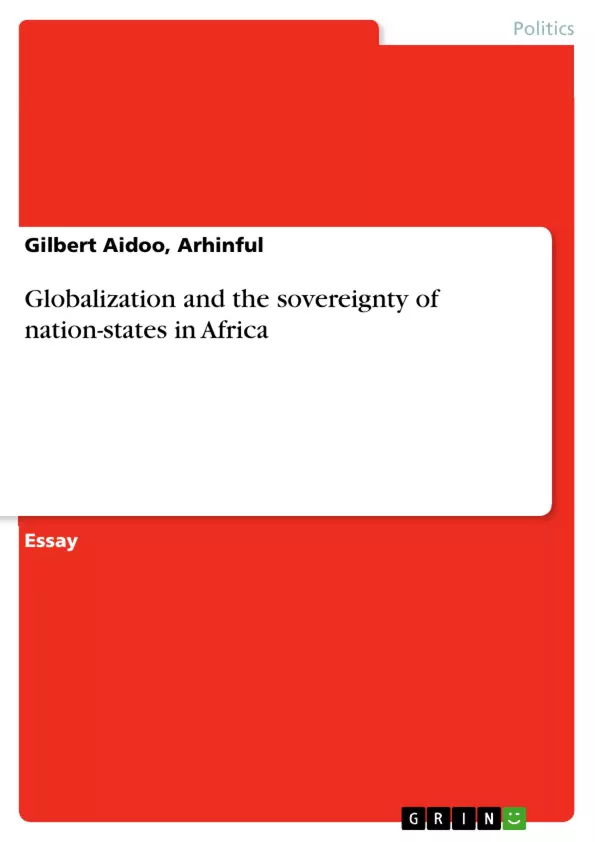This work seeks to examine the various perspectives associated with globalization, as well as the positive and negative implications for the sovereignty of nation-states in Africa.
The closer interaction between and among states is not a recent phenomenon. It particularly became popular when the victors of the WW2 came together in purpose of enhancing global peace and security, economic growth and reconstruction of the European economies that have fallen into the dark abyss of economic cacophony.
It is against this background that the United Nations (UN) was erected to substitute the failed League of Nations. The Bretton Woods’ institutions, International Monetary Fund (IMF), World Bank (WB), and General Agreement on Tariffs and Trade (GATT), which later metamorphosed into World Trade Organization (WTO) in subsequent years (1947) were created as a regime to regulate international trade. It must however be noted that many have ascribed such interactions between and among states to the event of globalization. Globalization has become some kind of "buzz word" used by people of all walks of life. Perhaps, it is one of, if not the most promiscuous concept in international relations.
Inhaltsverzeichnis (Table of Contents)
- 1.0 Introduction
- 2.0 Conceptualizing Globalization
- 3.0 Forms or Types of Globalization
- 4.0 Pros and Cons of Globalization
- 5.0 Globalization and Sovereignty of the Nation-State
- 6.0 Conclusion
Zielsetzung und Themenschwerpunkte (Objectives and Key Themes)
This paper aims to explore the diverse perspectives surrounding globalization, delving into its potential benefits and drawbacks, particularly in relation to the sovereignty of nation-states. The paper will also examine the different schools of thought on globalization, including hyper-globalists, anti-globalists, and transformationalists.
- Conceptualization and definitions of globalization
- The impact of globalization on nation-state sovereignty
- The various forms and dimensions of globalization
- The historical development and evolution of globalization
- The ongoing debate surrounding the benefits and challenges of globalization
Zusammenfassung der Kapitel (Chapter Summaries)
- 1.0 Introduction: This chapter introduces the concept of globalization, outlining its historical context and the increasing interconnectedness of the world. It also discusses the ongoing debate surrounding the benefits and challenges of globalization, highlighting the contrasting perspectives of its proponents and critics.
- 2.0 Conceptualizing Globalization: This chapter delves into the various definitions of globalization, examining the different interpretations offered by scholars, analysts, and policymakers. It explores different schools of thought on globalization, including hyper-globalists, anti-globalists, and transformationalists, and their respective views on the nature and impact of globalization.
- 3.0 Forms or Types of Globalization: This chapter examines the multifaceted nature of globalization, identifying its different forms and dimensions. It discusses the work of Keohane and Nye, who identified four main dimensions of globalization: economic, political, military, and cultural.
Schlüsselwörter (Keywords)
The paper explores the concept of globalization, focusing on its diverse perspectives, its impact on nation-state sovereignty, and the different forms and dimensions it takes. Key themes include the historical evolution of globalization, the debate surrounding its benefits and challenges, and the different schools of thought on its nature and impact.
Frequently Asked Questions
How does globalization affect the sovereignty of African nation-states?
The paper examines both positive and negative implications, discussing how international regimes and global economic integration can challenge the traditional autonomy of states in Africa.
What are the different schools of thought on globalization?
The study identifies three main perspectives: hyper-globalists, anti-globalists, and transformationalists, each viewing the impact and nature of globalization differently.
What role do Bretton Woods institutions play?
The IMF, World Bank, and WTO are discussed as key actors created after WWII to regulate international trade and finance, which are central to the globalization process.
What are the four dimensions of globalization mentioned?
Based on Keohane and Nye's work, the paper identifies economic, political, military, and cultural dimensions of globalization.
Why is globalization considered a "promiscuous" concept?
It is often used as a "buzzword" by people in various fields, leading to many different and sometimes conflicting definitions in international relations.
- Citar trabajo
- Gilbert Aidoo, Arhinful (Autor), 2019, Globalization and the sovereignty of nation-states in Africa, Múnich, GRIN Verlag, https://www.grin.com/document/506346



